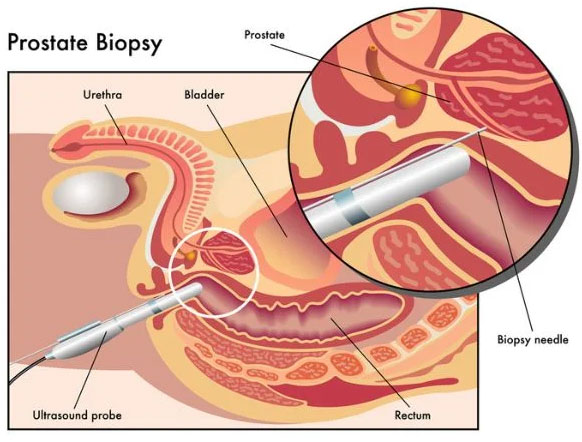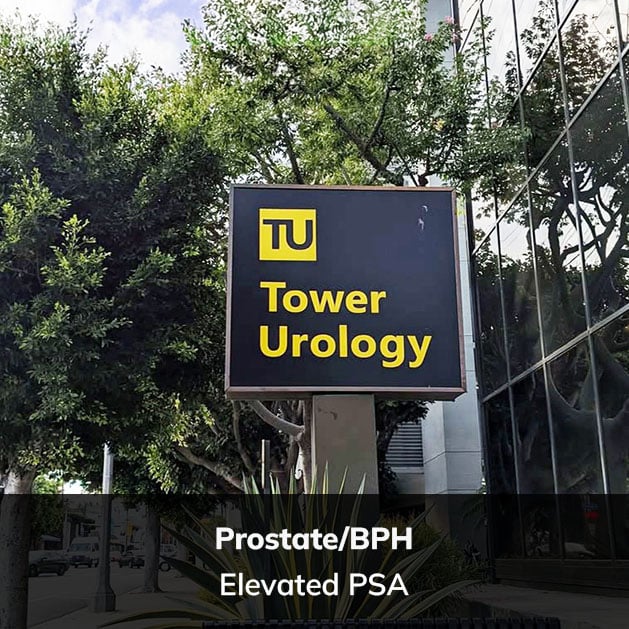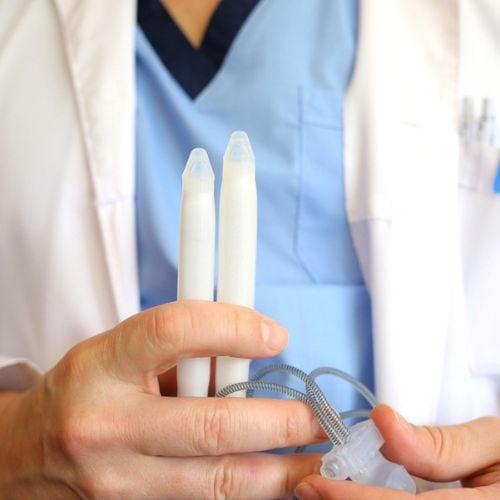What is elevated PSA, and what does it mean?
PSA stands for “prostate-specific antigen.” It is a protein that prostate cells make. A higher-than-normal PSA level tells your doctor that there is a possibility of prostate cancer, and they should check further.
Prostate cancer is the most common non-skin cancer in men, accounting for almost one in five cancers in men. The median age of diagnosis is 67 years. In other words, as many men under the age of 67 have prostate cancer as those above that age.

What are the common risk factors for elevated PSA and prostate cancer?
The main risk factors for prostate cancer are genetic. Specifically, having male relatives (especially first-degree relatives) with prostate cancer is a major reason that you may be at increased risk. There are also genetic mutations that put you at a significantly increased risk for prostate cancer.
African American men are at a particularly increased risk of being diagnosed with prostate cancer.
What are the symptoms of an elevated PSA or prostate cancer?
Unfortunately, you will not notice any symptoms of prostate cancer until it is widespread. This is not when we want to diagnose it! That’s why we strongly encourage screening with a blood test that will measure your current PSA level.
How do we generally diagnose prostate cancer?

We strongly recommend that men begin PSA level monitoring at age 50, with a PSA blood test every 1 to 4 years. For people with a family history of prostate cancer, PSA screening can start at age 45.
It is important to remember that test results showing an elevated level of PSA do not definitively mean you have cancer. There are numerous causes of elevated PSA besides cancer. These include an enlarged prostate, a prostate infection, abnormal urinary retention, trauma to the male reproductive system, etc.
Higher-than-normal PSA test results are just a sign that we need to investigate further. When a man presents with an elevated PSA, further testing is conducted. The most frequently used tests are MRIs and biopsies. This is how most prostate cancers are diagnosed. However, additional tests may sometimes be necessary.
What is a normal prostate-specific antigen (PSA) value?
Normal PSA (Prostate-Specific Antigen) values vary by age. This is because PSA levels naturally increase with age, even without prostate cancer or other conditions. In the past, PSA levels below 4.0 ng/mL were traditionally considered normal. More recent guidelines recommend these age-specific ranges:
- Ages 40-50: 0 to 2.5 ng/mL
- Ages 50-60: 2.5 to 3.5 ng/mL
- Ages 60-70: 3.5 to 4.5 ng/mL
- Ages 70-80: 4.5 to 5.5 ng/mL
Some medical organizations now recommend a lower cutoff of 2.5-3 ng/mL for men under 65.
What are the treatments for prostate cancer?
There are many different prostate cancer treatments. For low-risk prostate cancers, we usually recommend active surveillance. In other words, we will establish a follow-up program that regularly monitors your situation for any changes. Higher-risk prostate cancers can be treated with surgery, radiation therapy, or focal therapy (in select cases).
Tower Urology offers complete care for prostate cancer, including:
- Our in-house lab can run common blood tests, including more sensitive PSA markers like the Prostate Health Index and complexed/free PSA.
- Urine-based markers, such as exosomes.
- Advanced MR/Ultrasound guided fusion (UroNav) prostate biopsies.
Please note that there are some uncommon and less-recommended focal therapies, such as cryotherapy, which Tower Urology does not perform. Other technologies, including radiation, surgery, and HIFU, can treat the situations that cryotherapy can treat
What is the recovery process from these treatments?
The recovery process varies significantly based on the treatment that you will undergo.
One of the most common treatments is a radical prostatectomy. When performed robotically, you will most likely be able to go home the same day or the next day. Thankfully, pain is significantly reduced with our robotic surgery approach.
A catheter is required for approximately five to seven days after surgery.
The most significant side effects of prostate cancer surgery are urinary incontinence and erectile dysfunction. However, these side effects have been significantly reduced as our technologies and techniques have advanced.
Tower Urology is the best treatment center for elevated PSA and prostate cancer in Los Angeles
Tower Urology is proud to be home to urologists named by Newsweek as America’s Best Prostate Cancer Surgeons; a national recognition of their excellence in prostate surgery and treatment outcomes.
Prostate cancer is a very common cancer, but thankfully, it is very treatable. We find that patients often link the words “cancer” or “cancer cells” with the assumption of imminent death. The truth of prostate cancer is that when caught early (i.e., it has not spread), the five-year survival rate is nearly 100%.
As stated, the primary side effects of prostate cancer surgery and treatments are urinary incontinence and erectile dysfunction, which nobody wants. So, we pay close attention to each procedure to minimize these results.
At Tower Urology, we take a personalized, evidence-based approach to general urology care. All our professionals are dedicated to delivering expert care to you. We take the time to understand you and personalize your treatment plan to your needs.
We invite you to establish care with Tower Urology.
Tower Urology is conveniently located for patients throughout Southern California and Los Angeles, including Beverly Hills, Santa Monica, West Los Angeles, West Hollywood, Culver City, Hollywood, Venice, Marina del Rey, Burbank, Glendale, and Downtown Los Angeles.
Elevated PSA and Prostate Cancer FAQs
Absolutely, yes, but it is a sign that something is wrong. You need to be examined so we can begin discovering what is causing your elevated PSA.
Several non-cancerous factors can cause elevated PSA (Prostate-Specific Antigen) levels. Common Non-Cancerous Causes of Elevated PSA include:
- Age-Related Changes: PSA levels naturally increase as men age, even without prostate cancer or other conditions. Doctors often use age-specific reference ranges when evaluating PSA results, with different cutoffs for different age groups.
- Benign Prostatic Hyperplasia (BPH): An enlarged prostate, or BPH, is a common non-cancerous condition that can cause PSA elevation. As the prostate enlarges, it produces more PSA, leading to higher blood levels. BPH is particularly common in older men.
- Prostatitis and Inflammation: Inflammation of the prostate gland (prostatitis) can significantly increase PSA levels. This inflammation makes blood vessels within the prostate more permeable, allowing more PSA to leak into the bloodstream. Prostatitis can be acute or chronic and often causes symptoms like pain or urinary difficulties.
- Urinary Tract Infections (UTIs): UTIs, particularly those causing fever, can raise PSA levels due to inflammation or irritation of the prostate. Any infection involving the genitourinary tract may contribute to PSA elevation.
- Recent Sexual Activity: Ejaculation can cause a temporary increase in PSA levels. For this reason, doctors typically recommend avoiding sexual activity for 24-48 hours before a PSA test.
- Medical Procedures and Examinations: Several medical interventions can temporarily raise PSA:
- Digital rectal exams (DRE).
- Prostate biopsies.
- Catheterization.
- Recent surgery involving the prostate.
- Physical Activity: Intense exercise, especially cycling or activities that put pressure on the prostate, can temporarily increase PSA levels. Vigorous physical activity should be avoided for about 48 hours before a PSA test.
- Medications: Certain medications can affect PSA levels. For example, alpha-blockers for urinary symptoms can lower PSA, while other medications might raise it.
- Trauma: Any trauma to the perineal area can cause PSA elevation.
- Hormonal Factors: Research has found that men with higher testosterone levels also tend to have higher PSA levels.
When evaluating elevated PSA results, Tower Urology’s healthcare providers consider these factors before recommending further testing like prostate biopsies. For individuals with high PSA levels, only about 2% will have a form of prostate cancer requiring medical intervention.
Yes, there are several natural ways to potentially lower elevated PSA levels:
- Dietary Changes:
- Increase the number of fruits and vegetables you eat, especially tomatoes, which are rich in lycopene.
- Include more cruciferous vegetables like broccoli and cauliflower.
- Switch to a plant-based or low-fat diet.
- Reduce the amount of red meat and high-fat dairy products you eat.
- Include soy products in your diet.
- Drink green tea regularly.
- Lifestyle Modifications:
- Exercise regularly, aiming for at least 20 minutes of moderate activity 3 times a week.
- Maintain a healthy weight through diet and exercise.
- Manage stress through relaxation techniques, meditation, or yoga.
- Quit smoking if you currently smoke.
- Supplements and Natural Remedies:
- Consider adding ground flaxseed to your diet (about one tablespoon daily).
- Increase omega-3 fatty acid intake by eating fish or taking supplements.
- Ensure your body has enough vitamin D through sunlight exposure, diet, or supplements.
- Other Considerations:
- Avoid activities that may temporarily increase PSA levels before testing, such as cycling or sexual activity.
- Consult with your healthcare provider before starting any new supplement regimen.
Please note: While these methods may help lower PSA levels, they should not replace medical advice or regular prostate health screenings. Always consult your healthcare provider for personalized recommendations and address any concerns about elevated PSA levels.
Sources
Prostate Cancer Screening Tests
https://www.cancer.org/cancer/types/prostate-cancer/detection-diagnosis-staging/tests.html
American Cancer Society Recommendations for Prostate Cancer Early Detection
https://www.cancer.org/cancer/types/prostate-cancer/detection-diagnosis-staging/acs-recommendations.html
Prostate Cancer Screening Tests | American Cancer Society
https://www.cancer.org/cancer/prostate-cancer/detection-diagnosis-staging/tests.html
Prostate-Specific Antigen (PSA) Test
https://www.cancer.gov/types/prostate/psa-fact-sheet
Age-specific reference ranges of prostate-specific antigen in the elderly of Amirkola: A population-based study
https://www.ncbi.nlm.nih.gov/pmc/articles/PMC8099648/
Recommendation: Prostate Cancer: Screening
https://www.uspreventiveservicestaskforce.org/uspstf/recommendation/prostate-cancer-screening
































































